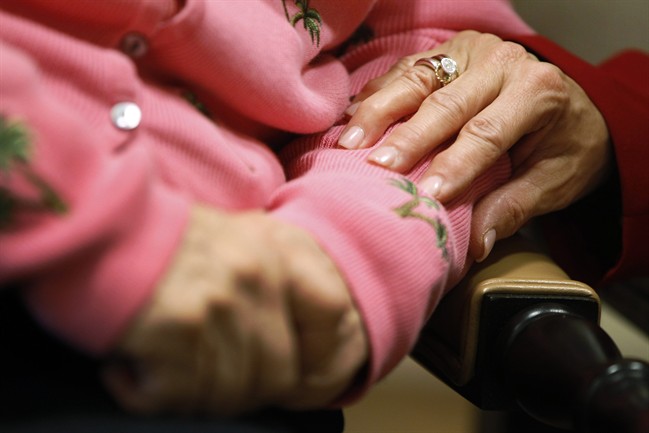TORONTO – A new study suggests that depression and mood changes could be an early warning sign for Alzheimer’s disease.

Apathy, irritability and lack of appetite are just some of the symptoms that could point to the onset of dementia as memory declines, according to Washington University scientists.
Doctors already established a link between Alzheimer’s and these mental health concerns, but pinpointing which comes first is an important step to consider, they say.
“There has been conflicting evidence on the relationship between Alzheimer’s and depression,” senior author and neurologist, Dr. Catherine Roe, said.
“We still don’t know whether some of these symptoms, such as irritability and sadness, are due to people realizing on some level that they are having problems with memory and thinking, or whether these symptoms are caused directly by Alzheimer’s effect on the brain,” she explained.
READ MORE: 10 warning signs of Alzheimer’s disease
For their research, Roe and her team analyzed the health data of more than 2,400 people who were 50 and older. Every seven years, the scientists evaluated the group’s test results on mental function and psychological health.
All of the participants were in good cognitive health at the start but as the study progressed, 1,218 of them developed dementia. That group was more likely to note changes in their mood first.
Four years into the study, for example, 30 per cent of them received a depression diagnosis compared to only 15 per cent who didn’t develop dementia. The group that developed dementia was 12 times more likely to have delusions.
WATCH ABOVE: Check out ‘s 16×9‘s powerful feature “The Unspooling Mind” featuring the personal story of Global National anchor Dawna Friesen
Right now, Alzheimer’s researchers are trying to develop tools to help them determine who’s most at risk for dementia. That way, doctors can start to treat the condition before it worsens.
Using depression and mood changes as markers may not work though, Roe concedes. Researchers first need to better understand how these changes are connected to the disease, she said.
Her full findings were published Wednesday evening in the journal Neurology. Read the full study here.
January marks Alzheimer Awareness Month. This year, the Alzheimer Society of Canada is hoping to inform women in their 40s and older about the warning signs of Alzheimer’s disease and how the society can help.
- What is a halal mortgage? How interest-free home financing works in Canada
- Capital gains changes are ‘really fair,’ Freeland says, as doctors cry foul
- Ontario doctors offer solutions to help address shortage of family physicians
- Budget 2024 failed to spark ‘political reboot’ for Liberals, polling suggests
The society launched its latest nationwide campaign – dubbed “The 72%.”
READ MORE: Women make up 72 per cent of Alzheimer’s patients
Women represent 72 per cent of Canadians living with Alzheimer’s disease. “We’re focusing on women for a number of reasons: the vast majority of Canadians affected are women, women are the primary decision-makers about health care and medical matters when it comes to the family and we also know that women are living longer and therefore at a higher risk of getting the disease,” Mimi Lowi-Young, CEO of the Alzheimer Society of Canada, told Global News.
A patient connected to the society, Faye Forbes, even encountered symptoms tied to the new research. As she dealt with bouts of forgetfulness, she’d close off – staying alone in her bedroom, overwhelmed and afraid to connect with the outside world because she felt like she was slipping away.
Doctors figured she was apathetic – she wasn’t eating, she didn’t care to talk to others. Initially, she was diagnosed with depression.
READ MORE: What are the early warning signs and symptoms of dementia?
The 72 per cent is a strong statistic – while the organization’s previous surveys found that most Canadians know someone living with dementia, Lowi-Young is certain most people don’t know how prevalent the disease is amongst women.
Warning signs are often misunderstood or ignored. But if they’re addressed, getting an early diagnosis could be a game-changer.
About 747,000 Canadians are living with some form of dementia and the society says this number is slated to double to 1.4 million in less than 20 years.
carmen.chai@globalnews.ca
Follow @Carmen_Chai




Comments